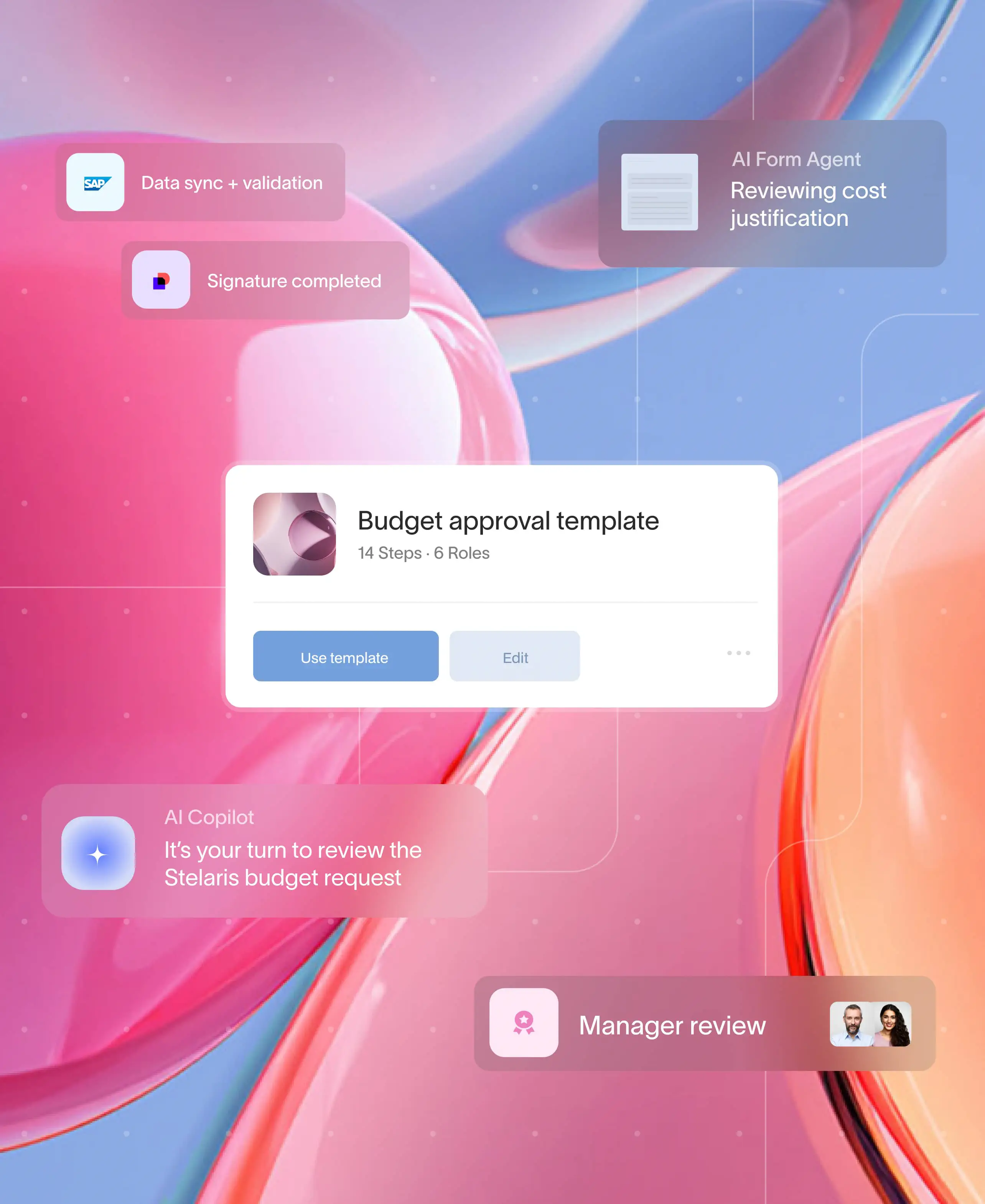
At a glance
Approval workflows are not just about routing documents they are the front lines of data security and compliance. Every contract signed, invoice approved, or client document reviewed must meet strict regulatory standards. In this guide, we’ll explore where approval risks originate, how to apply identity and access controls, why audit trails are vital, what compliance frameworks demand, and how Moxo embeds enterprise-grade security into external-facing workflows.
Risk model for approval data
Where risk originates in external approvals
Most approval processes today still run through unsecured channels like email or chat. Sensitive attachments are shared without encryption, and multiple versions of the same document circulate unchecked. Risks include:
- Unauthorized access: external participants forwarded an approval link or email without validation.
- Identity gaps: no assurance that the approver is who they claim to be.
- Audit blind spots: lack of logs to reconstruct who approved what, and when.
- Data residency issues: approvals stored outside of regulated regions (EU, U.S. healthcare, finance).
The IBM Cost of a Data Breach Report 2023 confirmed that the average breach cost was US$4.45 million, with compromised credentials the leading initial attack vector in 19% of cases (IBM, 2023). Approval workflows that lack identity controls are directly exposed to this risk.
Compliance failures and consequences
The consequences extend beyond breaches. Regulators have levied heavy fines where firms lacked approval visibility:
- In 2022, the U.S. SEC fined 16 financial institutions over US$1.1 billion collectively for recordkeeping failures tied to unmonitored communications (SEC, 2022).
- A Thomson Reuters study found 71% of firms increased compliance budgets in 2023 to strengthen governance processes, including approval recordkeeping (Thomson Reuters, 2023).
For approval workflows, compliance gaps don’t just risk penalties they erode client trust when processes appear opaque or insecure.
Access & identity (SSO, roles)
Role-based access control
Modern compliance frameworks emphasize the principle of least privilege. Approval systems must enforce clear role-based permissions:
- Submitters: can upload or request approvals
- Reviewers can comment or flag issues
- Approvers can sign off with legal authority
- Auditors: can view logs without editing rights
For example, in a vendor portal approval, the supplier may upload invoices but should never access internal discussion threads or unrelated financial data.
SSO/SAML and MFA
Centralizing identity through Single Sign-On (SSO) with SAML or OAuth ensures approvals are tied to verified enterprise identities. According to Gartner, organizations using SSO with MFA see a 50% reduction in credential-based breaches (Gartner IAM, 2023).
For external collaborators, requiring full SSO logins isn’t always practical. Moxo balances this by offering secure guest access and magic-link authentication, giving third parties controlled entry without creating unmanaged accounts.
Zero-trust alignment
Zero-trust frameworks, now recommended by NIST, require continuous verification of users and devices. Approval workflows align with this by enforcing checks at each stage, with no assumption that once logged in, a user has unrestricted access.
Audit trails & retention
Why audit trails matter
Approval workflows must answer three compliance questions:
- Who approved this document?
- When was it approved?
- Was the approval based on the latest version?
Without immutable logs, answering these questions during an audit becomes guesswork. Regulators like FINRA and GDPR Article 30 require organizations to maintain evidence of data handling decisions, including approvals.
Version history and traceability
Audit-ready workflows must include version control. If a client signs a contract, the system should prove it was the latest draft, not a superseded file. This reduces disputes and liability.
Export and reporting for regulators
Audit preparation is a major time drain. PwC’s State of Compliance 2023 report noted that automation in recordkeeping can cut audit prep time significantly (PwC, 2023). Moxo simplifies this with exportable audit logs regulators can be given full visibility without pulling fragmented records across systems.
Data residency/integrations
Regional compliance requirements
Data protection laws set strict rules:
- GDPR (EU): client data must remain in-region unless explicit safeguards exist.
- HIPAA (U.S. healthcare): requires strict access logging and breach notification protocols.
- FINRA (U.S. finance): mandates retention and auditability of communications and approvals.
Failure to align approval workflows with these regulations results in both fines and reputational fallout.
Moxo offers configurable security policies to meet residency requirements. In healthcare, its HIPAA-aligned workflows allow medical teams to collect approvals securely while maintaining audit trails.
Integration with CRM/ERP
Approvals often happen in the context of other platforms like Salesforce, SAP, or document repositories. If integrations bypass logging, they create compliance blind spots. Moxo’s integrations preserve approval records across systems, ensuring compliance is never compromised when workflows touch external data sources.
Moxo controls checklist
Certifications and enterprise alignment
Moxo delivers enterprise-grade compliance features, including:
- SOC 2-aligned security controls
- End-to-end encryption (in transit and at rest)
- SSO/SAML and MFA support
- Immutable audit trails
- Configurable data retention policies
Industry alignment
- Financial services: Secure, logged approvals for loan applications and vendor payments meet FINRA expectations.
- Healthcare: HIPAA compliance for patient approvals, consent forms, and medical workflows.
- Legal: Immutable version histories ensure signed contracts are defensible in disputes.
Why Moxo stands out
Unlike generic workflow or task management tools, Moxo is purpose-built for external-facing approvals. Clients and vendors interact through a branded, controlled environment with strict governance.
On G2, reviewers consistently praise Moxo’s compliance focus: “Audit trails and SSO integration made our reporting painless; compliance audits went from weeks to days.”
Compliance built in
Approval workflows are where security and compliance either hold firm or fail. Without audit trails, access control, and data residency, approvals expose organizations to breaches and regulatory action. Moxo embeds compliance into every approval so businesses can move faster, stay audit-ready, and protect client trust.
To see how Moxo can secure your approvals, book a demo.
FAQ
What is the biggest compliance gap in approvals?
Most failures stem from unsecured email or missing audit trails. Without logs, proving compliance is nearly impossible.
Do external users need accounts for secure access?
Not always. Moxo enables guest access with secure magic-links while retaining full auditability.
How long are audit trails stored?
Moxo supports configurable retention to meet GDPR, HIPAA, or FINRA requirements.
Can approvals integrate with CRM/ERP securely?
Yes. Moxo ensures integrations maintain logs and permissions, avoiding compliance blind spots.





